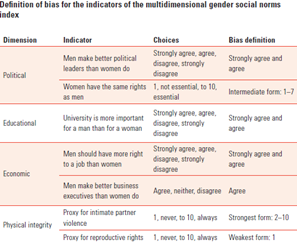

Context
Recently, the 1st edition of 'Gender Social Norms Index (GSNI) 2020' was released by the United Nations Development Programme (UNDP).
About
- GSNI 2020: The 1st edition of 'Gender Social Norms Index (GSNI 2020)' was released by UNDP, in an attempt to tackle gender norms which eventually are a broad contributor to gender inequalities.
- The report commemorates the 25th anniversary of the adoption of the Beijing Declaration and Platform for Action (Beijing+25).
- No country has yet achieved gender equality: Despite remarkable progress in some areas, no country in the world— rich or poor— has achieved gender equality.
- According to the report, the world is not on track to achieve gender equality by 2030.
- Overall, progress in gender inequality has been slowing in recent years. Based on current trends, it would take 257 years to close the gender gap in economic opportunity.
- Social norms and biases are a major cause in strengthening gender inequalities. Social norms held by individuals and their reference groups are values, beliefs, attitudes and practices that assert preferred power dynamics for interactions between individuals and institutions.
Situation of women around the world
- Few women leaders: The number of female heads of government is lower today than five years ago, with only 10 women in such positions among 193 countries (down from 15 in 2014).
- In Sub-Saharan Africa, 1 woman in every 180 giving birth dies (more than 20 times the rate in developed countries).
- There is parity in entry-level political participation, where power is very diffused. But when more concentrated political power is at stake, women appear severely underrepresented.
- The higher the power and responsibility, the wider the gender gap— and for heads of state and government, it is almost 90 percent. Only 24 percent of parliamentarian seats are held by women.
- Women represent only 21 percent of the world’s employers and 12 percent of the top billionaires.
- In S&P 500 companies, only 5.8 percent of CEOS are female.
- Large differences persist in occupational choices, with the share of female graduates in science, technology, engineering and mathematics (STEM) programmes lower than 15 percent for most countries.
- Women on average comprise 43 percent of the agricultural labour force in developing countries, while the share of female holders of agricultural land is only 18 percent.
Gender social norms index—measuring beliefs, biases and prejudices:
- GSNI was introduced in the 2019 Human Development Report for the first time and comprises of four dimensions—political, educational, economic and physical integrity.

- It is constructed based on responses to seven questions from the World Values Survey, which are used to create seven indicators.
- For indicators for which the answer choices are strongly agreed, agree, disagree and strongly disagree, the index defines individuals with bias if they strongly agree or disagree.
- Political indicators represent a bias for the choice of ratings of 7 or lower.
- For each indicator, a variable takes the value of 1 when an individual has a bias and 0 when the individual does not.
- GSNI captures how social beliefs can obstruct gender equality along multiple dimensions.
- Two methods of aggregation are used in reporting results in the form of an Index.
- Core GSNI: It is based on “union approach.” It measures the percentage of people with bias(es), independent of the number of biases.
- GSNI2: This second GSNI is based on “intersection approach.” It measures the percentage of people with at least two biases.
- Methods are applied to two sets of countries: The first set consists of countries with data for either wave 5 (2005–2009) or wave 6 (2010–2014) of the World Values Survey and uses the latest data available. This set includes 75 countries and territories accounting for 81 percent of the global population
- The second set consists of only countries with data for both wave 5 and wave 6. This set includes 31 countries and territories accounting for 59 percent of the global population.
Results from GSNI 2020 study
- Very few have absolute zero gender biases: Only 14 percent of women and 10 percent of men worldwide have no gender social norms biases. Overall, bias against gender equality is on the rise.
- The majority have at least one clear bias: In areas such as politics, economic, education, intimate partner violence and women’s reproductive rights, 91 percent of men and 86 percent of women show at least one clear bias against gender equality.
- Biasness: About 50 percent of men and women interviewed across 75 countries say they think men make better political leaders than women.
- Bias that men make better business leaders: More than 40 percent felt that men made better business executives.
- Compromised physical integrity: Almost 30 percent of people agree it is justifiable for a man to beat his partner.
- Men are relatively more biased: Women are skewed towards less bias against gender equality and women’s empowerment. 52 percent men have two to four gender social norm biases.
- Bias against gender equality is increasing in some countries: There is evidence of backlash in attitudes among both men and women. According to GSNI2, the proportion of people with moderate and intense biases against gender equality grew over the last few years in 15 countries (out of 31).
- Countries which made progress: Progress in the share of men with no gender social norms bias was largest in Chile, Australia, United States and the Netherlands.
- Countries which degressed: Share of men with no bias fell in Sweden, Germany, India and Mexico.
- Other countries which showed a backlash include India, South Africa and Romania.
- Positive correlation between biased social norms and gender inequality: Countries with higher social norms biases tend to have higher gender inequality.




